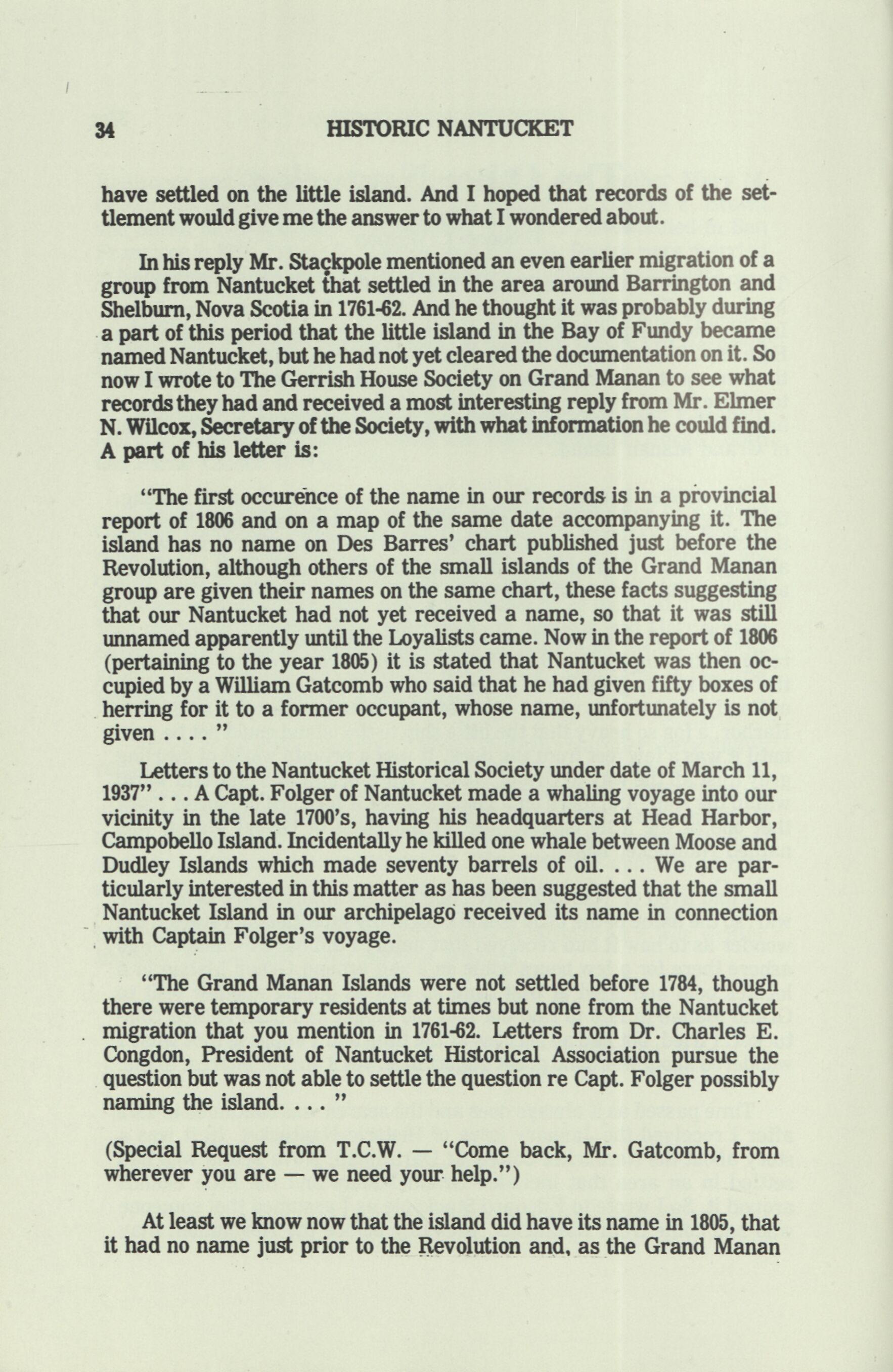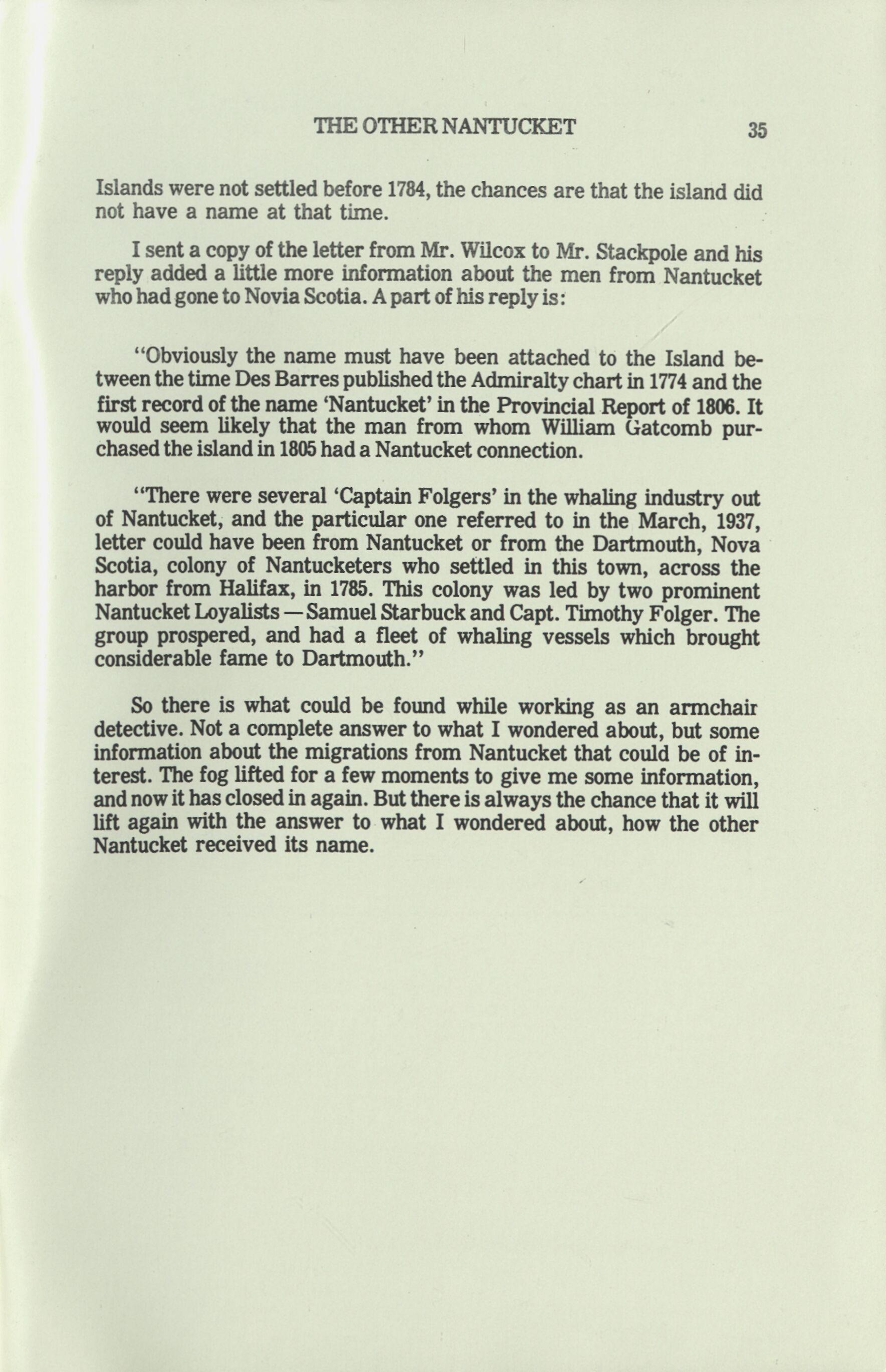
6 minute read
The Other Nantucket
33
by Theodore C. Wyman THERE HAVE BEEN many islands in my life, Nantucket, Little John, Monhegan, Grand Manan and the West Indies. Then there were Cocos Island, the Galapagos Islands and many others, including one of the Hebrides. Some of them I have known more than well and with some there has just been the pleasure of a few short visits. And now we come to a little island whose name is known, but no one seems to know how it happened to receive that name. It is the island of Nantucket off the coast of Grand Manan Island.
As so often happens when you begin to wonder about something, there begins what I think of as armchair detective work, and there are times when information can be found. Then there are other times when, although some information can be found, it is hard to find a definite answer about what is of interest to you.
It all started on my first visit to Grand Manan in 1967 when I received the impression that, if there could be fog at only one place in the world at any given time, the chances are that it would be in the Bay of Fundy. And that is what I ran into as I waited on the pier at Black's Harbor, a fog so heavy that the little ship to the island could not be seen until it was a few feet from the dock. It was a private world of swirling grey mist all the way to Grand Manan, but a bright and cheerful world within the ship. And there on a chart against a forward bulkhead I saw that one of the little islands just off the coast of Grand Manan was named Nantucket Island.
I had lived on Nantucket off Cape Cod for many years before the war, so the name of the little island caught my attention and started the wonder as to how it had received that name. I did have a chance to go ashore there for a few hours while on a sail around Grand Manan in a lobster boat and tried at that time as well as during another visit to Grand Manan in 1970 to find out how the island had been named Nantucket. I tried, but had no success at the time and I suppose that what I wondered about was of no great importance, yet it was of interest to me. Time passed as it always does and the search was continued in 1972 after I received the January issue of Historic Nantucket. In it was a story about the Nantucket Colony at Dartmouth, Nova Scotia who had settled in an area that included Grand Manan and the little islands around it. So I wrote to Edouard Stackpole as I assumed that someone who had come from Nantucket, probably before the Revolution, may
34 HISTORIC NANTUCKET
have settled on the little island. And I hoped that records of the settlement would give me the answer to what I wondered about.
In his reply Mr. Stackpole mentioned an even earlier migration of a group from Nantucket that settled in the area around Barrington and Shelburn, Nova Scotia in 1761-62. And he thought it was probably during a part of this period that the little island in the Bay of Fundy became named Nantucket, but he had not yet cleared the documentation on it. So now I wrote to The Gerrish House Society on Grand Manan to see what records they had and received a most interesting reply from Mr. Elmer N. Wilcox, Secretary of the Society, with what information he could find. A part of his letter is:
"The first occurence of the name in our records is in a provincial report of 1806 and on a map of the same date accompanying it. The island has no name on Des Barres' chart published just before the Revolution, although others of the small islands of the Grand Manan group are given their names on the same chart, these facts suggesting that our Nantucket had not yet received a name, so that it was still unnamed apparently until the Loyalists came. Now in the report of 1806 (pertaining to the year 1805) it is stated that Nantucket was then occupied by a William Gatcomb who said that he had given fifty boxes of herring for it to a former occupant, whose name, unfortunately is not given "
Letters to the Nantucket Historical Society under date of March 11, 1937" ... A Capt. Folger of Nantucket made a whaling voyage into our vicinity in the late 1700's, having his headquarters at Head Harbor, Campobello Island. Incidentally he killed one whale between Moose and Dudley Islands which made seventy barrels of oil. ... We are particularly interested in this matter as has been suggested that the small Nantucket Island in our archipelago received its name in connection with Captain Folger's voyage.

"The Grand Manan Islands were not settled before 1784, though there were temporary residents at times but none from the Nantucket migration that you mention in 1761-62. Letters from Dr. Charles E. Congdon, President of Nantucket Historical Association pursue the question but was not able to settle the question re Capt. Folger possibly naming the island. ..."
(Special Request from T.C.W. — "Come back, Mr. Gatcomb, from wherever you are — we need your help.")
At least we know now that the island did have its name in 1805, that it had no name just prior to the Revolution and, as the Grand Manan
THE OTHER NANTUCKET 35
Islands were not settled before 1784, the chances are that the island did not have a name at that time.
I sent a copy of the letter from Mr. Wilcox to Mr. Stackpole and his reply added a little more information about the men from Nantucket who had gone to Novia Scotia. A part of his reply is:
"Obviously the name must have been attached to the Island between the time Des Barres published the Admiralty chart in 1774 and the first record of the name 'Nantucket' in the Provincial Report of 1806. It would seem likely that the man from whom William Gatcomb purchased the island in 1805 had a Nantucket connection.
"There were several 'Captain Folgers' in the whaling industry out of Nantucket, and the particular one referred to in the March, 1937, letter could have been from Nantucket or from the Dartmouth, Nova Scotia, colony of Nantucketers who settled in this town, across the harbor from Halifax, in 1785. This colony was led by two prominent Nantucket Loyalists—Samuel Starbuck and Capt. Timothy Folger. The group prospered, and had a fleet of whaling vessels which brought considerable fame to Dartmouth."
So there is what could be found while working as an armchair detective. Not a complete answer to what I wondered about, but some information about the migrations from Nantucket that could be of interest. The fog lifted for a few moments to give me some information, and now it has closed in again. But there is always the chance that it will lift again with the answer to what I wondered about, how the other Nantucket received its name.








